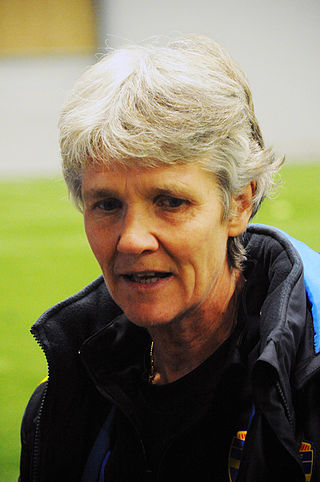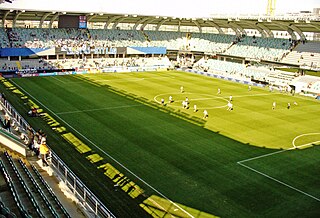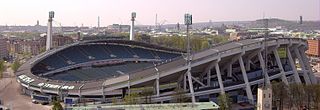
Pia Mariane Sundhage is a Swedish football manager and former professional player. Most recently she was the head coach of the Brazil women's national team. As a player, Sundhage played most of her career as a forward and retired as the top scorer for the Sweden national team, but she also had stints playing as a midfielder and a sweeper.
The 1989 European Competition for Women's Football took place in West Germany. It was won by the hosts in a final against defending champions Norway. Again, the competition began with four qualifying groups, but this time the top two countries qualified for a home-and-away quarter final, before the four winners entered the semi-finals in the host nation.
The 1995 UEFA Women's Championship was a women's association football tournament which was held between 11 December 1994 and 26 March 1995, involving UEFA-affiliated national teams who have qualified for the competition.
England's UEFA Women's Championship Record includes reaching the UEFA Women's Championship final thrice, in 1984, 2009 and 2022, winning the latter tournament on home soil. England women have also been losing semi-finalists on three occasions, and got knocked out in the finals group stage three times. On four occasions, including the 1989 to 1991 finals inclusive, England have failed to qualify for the final tournament.
Lena Mari Anette Videkull is a Swedish former association football forward who won 111 caps for the Sweden women's national football team, scoring 71 goals. Videkull can be seen in the Sveriges Television documentary television series The Other Sport from 2013.

The 2013–14 UEFA Women's Champions League was the 13th edition of the European women's championship for football clubs. The final was held at Estádio do Restelo, Lisbon, Portugal.
The 2014–15 UEFA Champions League knockout phase began on 17 February and concluded on 6 June 2015 with the final at Olympiastadion in Berlin, Germany to decide the champions of the 2014–15 UEFA Champions League. A total of 16 teams competed in the knockout phase.
Helen Björk is a Swedish former association football forward who won 88 caps and scored 23 goals for the Sweden women's national football team. She helped Sweden win the 1984 European Championship and played at the inaugural 1991 FIFA Women's World Cup.
The 2015–16 UEFA Women's Champions League knockout phase began on 7 October 2015 and concluded on 26 May 2016 with the final at Mapei Stadium – Città del Tricolore in Reggio Emilia, Italy, which decided the champions of the 2015–16 UEFA Women's Champions League. A total of 32 teams competed in the knockout phase.
The 2016–17 UEFA Women's Champions League knockout phase began on 5 October 2016 and concluded on 1 June 2017 with the final at the Cardiff City Stadium in Cardiff, Wales, which decided the champions of the 2016–17 UEFA Women's Champions League. A total of 32 teams competed in the knockout phase.
The 2017–18 UEFA Women's Champions League knockout phase began on 4 October 2017 and ended on 24 May 2018 with the final at the Valeriy Lobanovskyi Dynamo Stadium in Kyiv, Ukraine, to decide the champions of the 2017–18 UEFA Women's Champions League. A total of 32 teams competed in the knockout phase.
The UEFA play-offs of the 2019 FIFA Women's World Cup qualification competition involve the four runners-up with the best records among all seven groups in the qualifying group stage.

Sweden have participated ten times at the UEFA Women's Championship: in 2009, in 2017. They won the tournament in 1984.
The 2019–20 UEFA Women's Champions League knockout phase began on 11 September 2019 with the round of 32 and ended with the final on 30 August 2020 at the Anoeta Stadium in San Sebastián, Spain, to decide the champions of the 2019–20 UEFA Women's Champions League. A total of 32 teams competed in the knockout phase.
The 2019–20 UEFA Europa League knockout phase began on 20 February with the round of 32 and ended on 21 August 2020 with the final at RheinEnergieStadion in Cologne, Germany, to decide the champions of the 2019–20 UEFA Europa League. A total of 32 teams competed in the knockout phase.
The 2019–20 UEFA Champions League knockout phase began on 18 February with the round of 16 and ended on 23 August 2020 with the final at the Estádio da Luz in Lisbon, Portugal, to decide the champions of the 2019–20 UEFA Champions League. A total of 16 teams competed in the knockout phase.

The 2020–21 UEFA Women's Champions League knockout phase began on 9 December 2020 with the round of 32 and ended with the final on 16 May 2021 at the Gamla Ullevi in Gothenburg, Sweden, to decide the champions of the 2020–21 UEFA Women's Champions League. A total of 32 teams competed in the knockout phase.
Italy have participated 13 times at UEFA Women's Championship.
The 2022–23 UEFA Women's Champions League qualifying rounds began on 18 August and ended on 29 September 2022.

The 1984 European Competition for Women's Football final was a two-legged football tie to determine the winner of the 1984 European Competition for Women's Football. It was the first UEFA Women's Championship final, UEFA's top football competition for women's national teams. The match was contested by Sweden and England at Ullevi, Gothenburg, on 12 May 1984, and at Kenilworth Road, Luton, on 27 May 1984.




